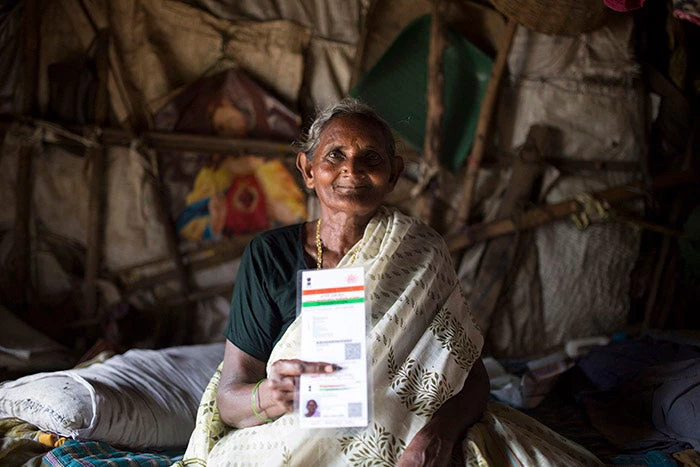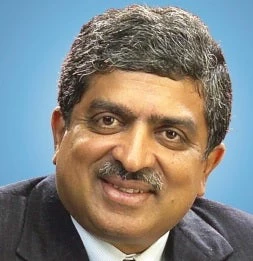
In Para village of Rajasthan, India, Shanti Devi’s livelihood depends on wages earned through MNREGA (India’s rural employment guarantee program) and a pension for her and her disabled husband. Eight years ago, a postman would deliver this cash to any household member he found. Sometimes she did not receive the full amount because a relative would claim her money. Even when she did, women like Shanti Devi did not have a secure way to save it because she was unbanked. Opening a bank account needed an individual identification card which many women lacked.
Today, Shanti Devi’s life has changed because of Aadhaar – her digital identity. All of her cash benefits are transferred directly into her bank account, which she was able to open with her Aadhaar number and her fingerprint. She can make and receive digital payments, with any person or business, even without a smartphone. With her ID, she is now fully empowered to exercise her rights, access services and economic opportunities. Most of all, she is afforded the dignity to assert her identity.
The New Data Rich
Shanti Devi’s struggle is not unique. It is the story of the 1 billion people globally who have no way to prove their identity. They are the most vulnerable in society, unable to access critical health care or social safety nets. They have difficulty accessing private services as well - registering for school or opening a bank account are huge challenges for the undocumented. Their lives become limited in potential and prosperity.
In India, we have seen how digital identification systems can deliver immediate benefits, facilitating a huge increase in financial inclusion and reducing corruption. Aadhaar enrolled 1 billion people in less than 6 years. The Indian government now saves billions of dollars every year, through reduced fraud and leakages in the Direct Benefit Transfer regime.
Aadhaar encouraged the creation of more digital platforms for basic services. There are now APIs in India for identification, payment, document storage, utility bill payment, etc. that collectively allow for an innovative, low-cost, high-volume way of transacting with people. Collectively, these platforms are called the “India Stack”. The India Stack is a digital infrastructure, built as a public good, that enables a presence-less, paperless, and cashless service delivery by governments as well as business.
Unlike many developed countries, Indians are becoming data-rich before being “economically” enriched. The India Stack, built on top of Aadhaar, provides people with the tools to leverage their data. Empowered with their data, people can negotiate access to better credit, healthcare, attain better skills and access welfare benefits. The India Stack also ensures this data exchange happens in a safe, privacy-preserving manner, and with informed user consent. Empowering Indians with their data has huge social and economic potential. Key to realizing this potential, as was noted by the Indian Supreme Court in its recent verdict in support of Aadhaar, will be to introduce a comprehensive legal regime for data protection and empowerment.
What can countries learn from each other?
Nowhere are the challenges more urgent and the opportunities most palpable than in Africa, where half a billion people have no form of identification, and two-thirds of children are not registered at birth. India’s experience has proven this gap can be addressed much before 2030, and can produce economic dividends, while also empowering people to take control of their data.
The World Bank Group estimates it will take $6 billion to meet Africa’s digital identification and civil registration needs. In September, I participated in the WBG-organized Africa Leaders Roundtable on the sidelines of the UN General Assembly. African leaders and development partners stressed the importance of reducing the identification gap to promote regional integration and the free of movement of people, goods, services and capital. However, they urged that these systems must be built for interoperability, and must, at all times, protect privacy.
Africa can look to other countries for lessons learned and the benefits that can be realized by committing to the digital identification agenda. Thailand’s national ID system enabled the country to expand health insurance coverage from 75 percent to 98 percent in less than three years. Peru has achieved near universal ID and as a result brought in $45 million of annual revenue for the government. In India, Aadhaar enabled the opening of nearly 300 million new bank accounts. When governments, the private sector and development partners work together to make identification a priority, the benefits result in an inclusive and prosperous society for all.
Leapfrog to the digital economy
The global community will converge in Bali this week for the World Bank Group/IMF Annual Meetings to discuss the most pressing development issues of our time: human capital, climate change, the global economy, gender equality, disruptive technology, and much more. Digital Platforms and Innovation will take center stage on October 12th when I join a group of distinguished panelists to discuss how these powerful platforms are spurring innovation and creating economic opportunities.
Developing countries – and in particular countries in Asia and Africa – are in a position to move quickly to a new digital paradigm in which users are in control of personal data and are empowered to use this data to improve their lives. It will require investment in connectivity, as well as identification and payments systems. The effort will need coordination across government agencies as well as between public and private sector. For real success, nations will also need modernized legal and regulatory regimes.
While this may seem like a lot to do, it is clear that these things can be done. The good news is, for the most part, we know how to do them. From Rajasthan to Lima, digital platforms can be a path to prosperity.
Nandan Nilekani is the Co-founder of Infosys and the Founding Chairman of Unique Identification Authority of India. He also serves on the World Bank Group’s Identification for Development (ID4D) High Level Advisory Council. He will be speaking at the World Bank Annual Meetings Panel on Digital Platforms and Innovation on October 12th at 14:30 WITA (Bali, Indonesia). Watch live here.


Join the Conversation